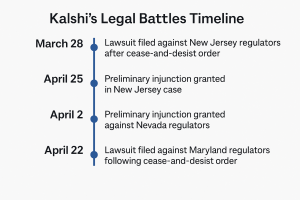Prediction market operator Kalshi has achieved another courtroom victory, this time in New Jersey, where a federal judge issued a preliminary injunction (pdf) that temporarily halts state efforts to restrict its sports event contract offerings. This marks the second time a court has ruled in Kalshi’s favor, following a similar outcome in Nevada, as the company fights back against state regulators seeking to classify its operations as unauthorized sports betting.
Kalshi filed a legal challenge against the New Jersey Division of Gaming Enforcement (NJDGE) and Casino Control Commission after receiving a cease-and-desist letter in March, accusing it of violating the state’s constitution and sports wagering laws. Kalshi countered with the argument that its event contracts are not gambling but regulated derivatives under the authority of the Commodity Futures Trading Commission (CFTC), the federal agency that oversees U.S. derivatives markets.
Judge Upholds Federal Oversight Over State Enforcement
U.S. District Judge Edward Kiel, in granting the injunction, emphasized that Kalshi’s sports-related contracts likely fall under the CFTC’s exclusive jurisdiction. In his ruling, Kiel wrote, “I am persuaded that Kalshi’s sports-related event contracts fall within the CFTC’s exclusive jurisdiction and am unconvinced by defendants’ arguments to the contrary.” The NJDGE had maintained that Kalshi was operating an unlicensed gambling business within the state, arguing that sports outcomes did not qualify as financial instruments. Judge Kiel, however, found that the contracts did carry “potential financial, economic, or commercial consequence” and thus fell within the federal regulatory framework, according to The Closing Line on Substack.
The judge also highlighted potential irreparable harm to Kalshi’s business if state enforcement actions continued unchecked. Citing reputational damage and the loss of business opportunities—such as a partner declining to list Kalshi’s products in New Jersey after receiving the state’s letter—Kiel concluded that the balance of factors supported granting interim relief to Kalshi. “The balancing of the factors here caution me to keep the toothpaste in the tube,” he noted.
Kalshi’s Legal Strategy Expands Across States
This injunction in New Jersey follows an earlier court victory in Nevada, where Kalshi filed a similar lawsuit after receiving a cease-and-desist order. The company has also initiated legal action in Maryland under comparable circumstances. So far, six states—including New Jersey, Nevada, Maryland, and Ohio—have sent cease-and-desist letters to Kalshi and other prediction market operators, alleging violations of state gambling laws.
Kalshi maintains that these legal threats are unfounded, as its contracts are not intended for wagering in the traditional sense but are federally regulated financial products. The CFTC, which has regulatory authority over Kalshi as a Designated Contract Market, had scheduled a roundtable discussion to evaluate the regulatory future of prediction markets, but the event was recently canceled with no new date announced.

Implications for the Future of Prediction Markets
The court’s decision comes at a critical time for Kalshi and the broader prediction market industry. By continuing to operate in all 50 states—including those with strict gambling laws—Kalshi is pressing the argument that its contracts are legally permissible under federal law. The company’s platform allows users to trade contracts on the outcomes of various events, including not just sports, but topics ranging from pop culture to global affairs. Recent examples include contracts on whether Elon Musk and Mark Zuckerberg will fight, or who will become the next pope.
The ruling is also significant for its potential ripple effects on state-regulated sports betting. With states like New Jersey generating millions in tax revenue from online sports betting—$138.3 million last year alone—Kalshi’s model presents a disruptive challenge. If prediction markets like Kalshi’s are allowed to operate outside state control and without the associated taxes, existing players such as DraftKings and FanDuel, which are heavily invested in state licensing regimes, could find themselves at a competitive disadvantage.
Despite the victories in court, the regulatory landscape remains far from settled. Federal law, including the Wire Act and CFTC Rule 40.11, leaves room for interpretation, especially around what types of contracts are permissible. As Kalshi’s lawsuits continue and other states weigh their options, the legal status of prediction markets will likely remain a contentious and evolving issue.
What Comes Next for Kalshi and State Regulators?
While the preliminary injunction allows Kalshi to continue offering its sports event contracts in New Jersey for now, the final outcome will depend on the court’s eventual ruling on the merits of the case. Meanwhile, Kalshi’s lawsuits are testing the limits of federal preemption in financial regulation, potentially setting precedents for how prediction markets are treated nationwide.
With Maryland next in line and Ohio possibly following suit, Kalshi’s legal campaign is far from over. Still, for now, it continues to gain ground in its effort to operate prediction markets free from state-imposed gambling regulations.



